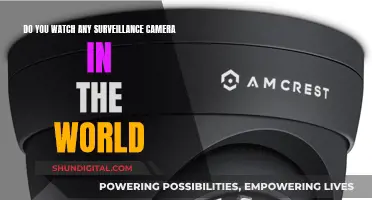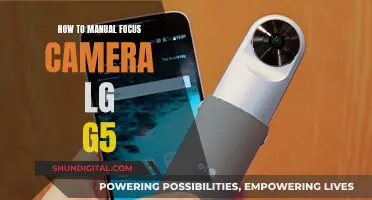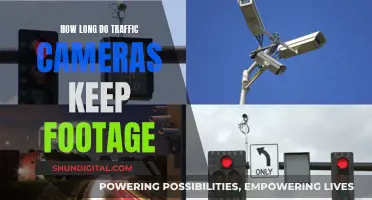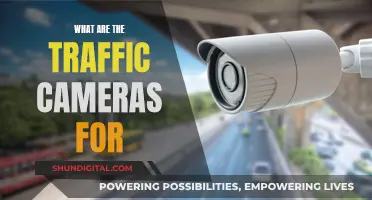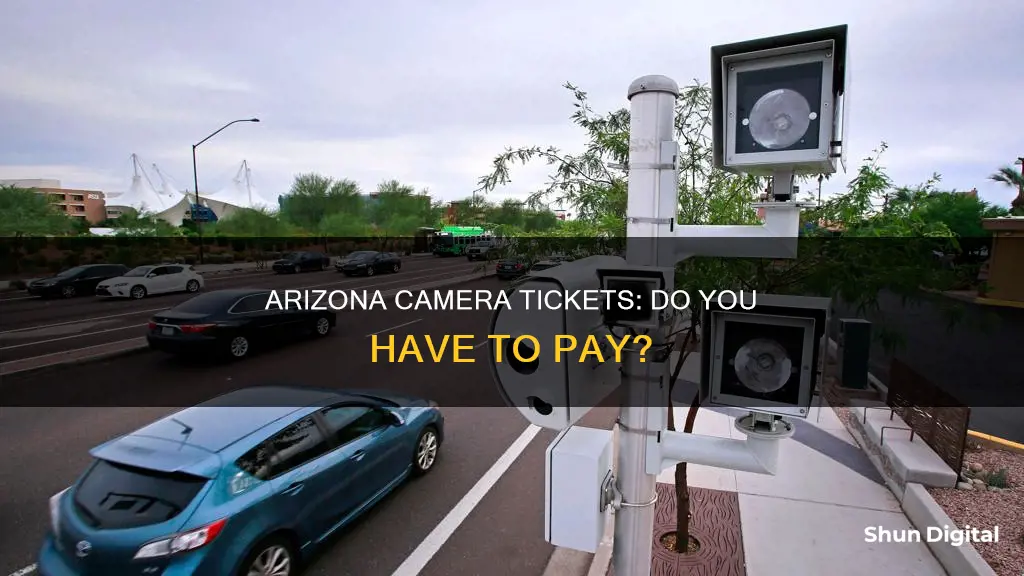
Getting a traffic ticket is never fun, especially when it's a photo radar ticket. While speed cameras are completely legal in Arizona, there are some nuances to the law that may help you get out of paying a fine.
Photo radar tickets are generated by a network of traffic cameras that take photos of vehicles under certain conditions, such as speeding or running a red light. These tickets are entirely enforceable in Arizona, but there are some loopholes. For example, if you receive a ticket in the mail, it may not be a certified court document and you may not be required to respond. However, if you are served a ticket in person, you will likely have to pay the fine or fight it in court.
What You'll Learn

Mailed tickets vs. served citations
In Arizona, there are two ways to receive a ticket for a traffic violation caught on photo radar: by mail or by service. According to Arizona law, the county has 60 days from the violation date to file the citation with the courts. After the filing date, they then have 90 days to serve you with a citation.
Mailed Tickets
If you receive a notice of a traffic violation in the mail, it is important to note that unless it was sent and filed by the court, it is not a certified court document. This means you are not legally required to identify anyone in the photo or respond to the notice. While the photo radar company can impose fees if the fines are not paid by a certain date, they are not enforceable unless filed by the county court. Therefore, you may ignore the notice and hope that the county does not proceed to serve you with the ticket.
Served Citations
Your likelihood of being served with a ticket largely depends on the area, as some counties are more aggressive than others. To serve a citation, the courts must file the violation and employ a process server to deliver the citation. They can either serve you personally or serve someone of a "reasonable age" in the household (14 years or older).
If you do not wish to be served, it is often recommended that you take no action until the 90-day period for serving the citation has passed. If they fail to serve the citation within this time frame, you are not obligated to pay the fine. However, some counties employ alternative service methods, such as taping the documents to your door or leaving them at your address in plain view.
What to Do If Served
Once a traffic ticket has been formally served, court proceedings will move forward, typically in the form of civil traffic hearings. If you are charged, you may incur points against your license through the Motor Vehicle Division. Photo radar charges usually involve speeding (3 points) or running a red light (2 points). In addition to a fine, you may be required to complete Traffic Survival School and may experience an increase in your auto insurance rates. Accumulating 8 points within a year could result in a license suspension.
Charging Exilim Cameras: A Quick Guide
You may want to see also

Are photo radar tickets enforceable?
Photo radar tickets are enforceable in Arizona. However, there are several ways to avoid payment.
Firstly, if you receive a ticket in the mail, you can ignore it if it was not sent and filed by the court, meaning it is not a certified court document. In this case, you do not legally need to identify anyone in the photo or respond to the notice. Although the photo radar company can still choose to impose fines if not paid by the deadline, these fees cannot be enforced unless filed by the county court.
If you are served a citation, the court must first file a violation and then hire a process server to give you the citation, either directly or to someone of a "reasonable age" in your home (14 years or older). If the county fails to serve the citation within the specified time limit, you may not have to pay the fine.
If you are served a violation and fail to pay it within the specified deadline, your license could be suspended. If you continue to drive with a suspended license, you could face a fine of up to $2,500 and up to six months in jail. However, you can choose to fight the ticket if you believe you were wrongly ticketed and have evidence to prove your case.
Polaroid Camera Battery Guide: Choose the Right Power Source
You may want to see also

What to do if you receive a photo radar ticket
If you receive a photo radar ticket in Arizona, it's important to understand your rights and the possible consequences of your actions. Here are some detailed instructions on what to do if you receive one of these tickets:
Understand the Ticket
Firstly, it's crucial to understand the difference between a mailed ticket and a served citation. A mailed ticket is a notice of violation sent by the municipality, while a served citation is delivered in person by a process server. Arizona law allows 60 days from the violation date for the county to file a citation with the courts and an additional 90 days to serve you with the citation.
Mailed Tickets
If you receive a mailed ticket, you may be able to ignore it. Unless it was sent and filed by the court, it is not a certified court document, and you are not legally required to respond. While the photo radar company can impose fees if you don't pay by the deadline, these fines cannot be enforced unless the county court is involved. However, there is a chance that the county will take further steps to serve you with the ticket.
Served Citations
If you are served with a citation, it becomes legally enforceable. A process server may come to your home and physically hand you the ticket, or they may give it to another person of "reasonable age" (14 years or older) in your household. Alternatively, the court may allow for alternative service, where the ticket is served by certified mail. Once served, you must either pay the ticket or fight it in court.
Fighting the Ticket
If you believe you were cited unjustly, you have the option to dispute the ticket in a civil traffic hearing. You can present evidence and argue your case before a judge, who will make the final ruling. However, keep in mind that the cost of fighting the ticket may exceed the fine itself.
Potential Consequences
Ignoring a served citation can result in serious consequences. Failure to respond can lead to a license suspension, and driving with a suspended license can incur additional fines and even jail time. Therefore, it is essential to make an informed decision and take appropriate action when dealing with a photo radar ticket in Arizona.
Exploring Raspberry Pi Camera's TL Mode: What's Special?
You may want to see also

What happens if you ignore a photo radar ticket?
Photo radar tickets are enforceable in Arizona, but there are ways to avoid payment. If you believe you have been cited unjustly, you can choose to fight the ticket.
If you receive a mailed ticket, you may be able to ignore it if it was not sent and filed by the court, meaning it is not a certified court document. Although the photo radar company can still choose to impose fines if not paid by the deadline, these fees cannot be enforced unless filed by the county court.
However, if you ignore a served violation, your license could be suspended. If you continue to drive with a suspended license, you could face a fine of up to $2,500 and up to six months in jail.
If you choose to ignore the ticket, the odds of being served with a citation depend on the area, as some counties are more aggressive than others. The courts must file the violation and employ a process server to hand the citation to you directly or to someone of "reasonable age" in your household (14 years or older).
If you are not served within 90 days, the ticket is generally removed from the system. However, some counties are employing alternative service methods, such as getting a court order to certify and tape the documents to your door or leave them at your address in plain view.
It is recommended that you do nothing until you are served. If they fail to serve the citation, you do not need to pay the fine.
Shipping Camera with Battery: Europe-Specific Guide
You may want to see also

How to fight a photo radar ticket
Arizona's photo radar tickets, also known as the Red Light Camera Enforcement Program, are generated by a network of traffic cameras that take photos of vehicles under certain conditions. They are entirely enforceable in Arizona, but you can choose to fight it if you believe you were cited unjustly. Here are some tips on how to fight a photo radar ticket:
Know the Ticket Types:
There are two types of photo radar documents that you can receive in the mail:
- Notice of Violation: This is not a ticket but a request for information. You are not legally obligated to respond or identify the driver. The police issue this notice when they cannot identify the driver from the photo. Since the city has only 60 days from the violation date to issue a ticket, not responding often results in no ticket being issued.
- Traffic Ticket and Complaint: This is the actual ticket and will be multiple pages long. It means there is a court case involving the named driver. Do not mail anything to the court or respond to the ticket without first speaking to an attorney, as you may unwittingly waive some of your rights.
Understand Service of Process:
Service of process refers to the procedure through which the State of Arizona provides a driver with formal notice of a photo radar ticket. It is important because it is how the court acquires personal jurisdiction over a defendant. The State has 90 days from the date the ticket is filed with the court to serve you. If you are not served within this time frame, your case will be dismissed.
Service can be done through:
- Personal Service: A licensed process server or a police officer personally delivers a copy of the ticket to the defendant or someone of suitable age (usually 14 or older) residing with the defendant.
- Substitute Service: The process server delivers the ticket to someone of suitable age and discretion who lives with the defendant.
- Alternative Service (used mostly by Scottsdale): If standard service methods are unsuccessful, the process server may submit documents describing their attempts, and the prosecutor may file a motion requesting permission for alternative service. This involves mailing a copy of the ticket by first-class and certified mail and posting copies to the defendant's front door or garage door. Once these steps are taken, the defendant is considered served.
Decide on a Course of Action:
If you receive a photo radar ticket, you have several options:
- Wait and Don't Respond: You can ignore the mailed ticket until it is served or service is waived. If you are not served within 90 days, the ticket will be dismissed.
- Take Defensive Driving School: If you are eligible and want to get the ticket behind you, you can take a 4-hour online class for around $250, after which the ticket will be dismissed.
- Mail Something to the Court: Sending a letter stating you were not the driver generally doesn't help and may waive your right to be served. However, if you've already been served, there's nothing to lose by trying.
- Request a Service or Civil Traffic Hearing: If you believe you weren't properly served or have a solid argument, such as proving you weren't the driver, you can request a hearing. Be cautious, as it is easy to waive service if you use the wrong language or make a general appearance in court.
Know Your Rights and the Law:
- Do not waive your rights: Filling out paperwork, sending a response, going to court, or writing an angry letter to the judge can all be considered a waiver of your rights.
- Understand your options: Know the difference between a Notice of Violation and a Traffic Ticket and Complaint, and be aware of the service of process rules and your rights if it is not done correctly.
- Check your case status: You can safely check the status of your ticket online without waiving your rights. However, requesting defensive driving school online may be considered a waiver.
- Know the penalties: Photo radar violations are usually civil traffic offenses with associated fines and points. Speeding violations result in 3 points, while red light violations are 2-point violations with a fine of around $250. Accumulating too many points can lead to a license suspension and increased insurance rates.
- Consider hiring an attorney: If you are facing a license suspension, have multiple citations, or are a commercial driver, it may be advisable to seek legal representation. An attorney can help negotiate or amend tickets and provide guidance on your best course of action.
Charging Camera Without a Charger: Alternative Methods
You may want to see also
Frequently asked questions
If you receive a mailed ticket, you may be able to ignore it if it was not sent and filed by the court, meaning it is not a certified court document. Although the photo radar company can still choose to impose fines if not paid by the deadline, these fees cannot be enforced unless filed by the county court.
Failure to respond to a served violation can result in a license suspension. Driving with a suspended license can cause you more trouble down the line, including 6 months in jail and a fine of $2,500.
Also known as the Red Light Camera Enforcement Program, camera tickets are generated by a network of traffic cameras that take photos of vehicles under certain conditions. They will snap a photo if their sensors detect motion during a red light or they sense anything over the speed limit.
If you believe you were served with a notice of violation but still want to contest it, your case may go to a civil traffic hearing. These hearings generally involve several parties, including the people who want to convict you, the defense and your attorney (if you choose to hire one), and the judge who will make the ultimate ruling in the case based on the evidence presented by both sides.




